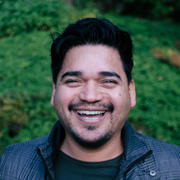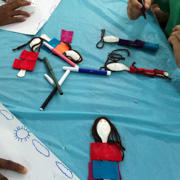
It was the spring of 1993. I was 7 years old, traveling through northern Mexico with my grandparents. This is one of the first memories I recall before learning about my family relocating from northern Mexico to the US. I remember walking with my grandparents and being nervous as we approached the US border checkpoint. I held their hands as we walked across the Rio Grande border in South Texas.
My parents were waiting for us on the U.S. side. They were staying in a small one-bedroom motel room in Pharr, Texas. A few days later, we found our first rental house and began a new life in this new country. There was a lot of unknowns but we trusted God, pushed forward, and knew that we were embarking on a very difficult but rewarding task.
As I process my experience of growing up in this place, I am saddened about how often as a culture we form preconceived, stereotypical ideas of places and people without actually knowing someone from there or ever having visited the place to learn more about it. I wonder how our perspective would change if we were reminded that every place in our world is full of people with extraordinary stories of endurance, hope and perseverance.
What if we were reminded of our own stories and saw people not as “needy” or “poor” but, instead, saw their humanity and their potential? What if we saw that each of us are trying our hardest in the midst of oppression, fighting the stereotypes we sometimes get placed in?
Too often, we dehumanize people without hearing their stories or without knowing what they’ve gone through, where they come from, or where they hope to go.
For many people, “the border” is a scary place. It’s a place of violence, it’s unsafe and a place full of brokenness. In some cases, this is reality. Life near the border is just like life in any other place in our country—both good and bad. But regions like the border receive different news coverage. The bad news is heightened and amplified while the good news is almost unspoken of.
But for me, the border doesn't represent negative stereotypes. I grew up on the border. My parents chose to settle there in 1993, and I lived there for many years before moving to the Midwest. I grew up there, went to school there, and most of my family currently lives there. Many of my moral values and character were shaped by growing up in this region of the U.S.
.jpg)
When I think about the border, I think about my parents. I think about the sacrifice they went through to give their family a chance for a better future. I think about what they gave up to pave a new path for me. I think about a hardworking group of Mexican-American people who, through their work ethic and long works hours, sometimes under the unbearable heat of South Texas, work hard to provide for their families.
The border showed me how to work hard for what I want. It taught me to dream that life could be different. When I first came to the U.S., I could only speak Spanish, and it was in South Texas where I first learned to speak English. I grew up to be bilingual and this ability has opened many doors of opportunity for me.
.jpg)
If you’ve never visited the border, let me share this with you as someone who’s lived there: the border is a place full of hard working people. It’s a place where many people came because they aspired for a better life. Just like in many communities across our nation, people there worship and pray to the same God that you pray to and worship in your own church. People there face the same struggles that you and your family face in your own community. For many families that live in South Texas, the border means opportunity, it means a new outlook on life.
I’ve been extremely challenged by our lack of dialogue lately, but I truly believe that if we can place ourselves into opportunities where we can listen and understand each other’s stories and struggles, there’s no way we cannot love each other.
It’s hard not to love someone once you’ve heard their story and you can share empathy for one another. Often, we have lost the art of dialogue and we are too occupied with our own agenda to sit down with people and share and learn from one another. I believe our lives would be changed dramatically if we simply took the time to listen to those who are different from us.
.jpg)
EM is currently partnering with my parents’ ministry in South Texas. Would you consider bringing a mission trip team to serve alongside this community and learn more about the real people who live here? I wonder how mindsets might change if people took the opportunity to visit with others who share their same beliefs, same struggles, and same desire to worship and live a life that is honoring to Christ. I believe many of our preconceived, stereotypical ideas of what “the border” is like will be radically challenged, changing our perspective so we can start to see each other as people with God-given human dignity, who deserve to be valued, respected, and loved.
More Mission Stories


Site developed and hosted by Skycog, Inc.
